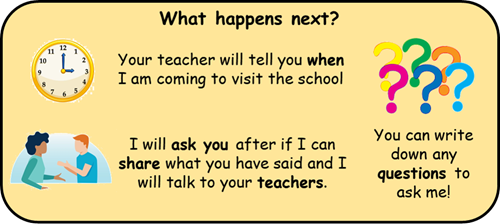While all these professions address mental health in different ways, an Educational Psychologist is separate from a clinical psychologist, a therapist or other mental health professionals. An Educational psychologist focuses on educational settings and the wellbeing and learning of young people.
Educational psychologists may support children with their mental health and help the adults around the child support them, but this will not take the same form as therapy and they cannot prescribe medication.
A psychiatrist or GP can offer medication for mental health, while therapists conduct individual or group sessions with people using a variety of therapeutic models.
Telford and Wrekin also have a mental support health team (Bee U) where Educational Mental Health Practitioners (EMHPs) may work with children in schools, offering short term support for their mental health using Cognitive Behavioural Therapy (CBT). Click here for more information about different psychological professionals and mental health services.
No, parents cannot refer to the Educational Psychology Service. If a parent has concerns about their child, they should speak to their child’s class teacher or the schools SENCO. The school SENCO will then make a referral to the Educational Psychology Service if deemed necessary.
Young people who have received involvement by the Educational Psychology service will often be reviewed at a later date in the year. This will involve either key members or staff or an Educational Psychologist gaining an understanding how the young person situation has changed since their involvement and what next steps can be taken. An EP will discuss at this review whether further engagement is needed.
Educational Psychologists work with young people in a variety of ways. Sometimes, an EP may be curious about how a child learns or understands information. They may ask the child to complete a series of different activities to gain insight into this. This can involve drawing, playing games, completing activities around memory and many more. Often, assessments have referred to a standardised assessment, which is when a psychologist completes a measure to look at a static construct, e.g memory or intelligence. At Telford EPS, we believe assessment is much wider and use a range of applicable tools to the young persons learning environment. We often conduct dynamic assessments if appropriate to understand children, which you can find out more about here. If a psychologist has used an assessment tool, they will inform you about how, why and give feedback from this during a consultation.
Parents know their children best and will know how to communicate with them. Sometimes it can be helpful for children to understand what a visit will look like and parents can use the Information for Parents and Young People to discuss with young people. Some EPS may send a One Page Profile, which explains a little more about them. It can often help if a parent or young person writes down any questions or key points they would like to explore before a visit. If you have any questions before an EP visits, you can click here to see what an EP might do in school or talk to your school’s SENCO for more information.

As our work contains many forms, a formal written report may not always be needed. At Telford EPS, we are passionate about co-constructing information with all involved and feeding back our perspectives with schools, parents and young people through consultations. This process allows all to be involved and jointly construct a plan that is practical and responsible to support the child. If your child is currently going through an EHC needs assessment, psychological advice by the EPS will be formally written and shared with parents/carers.
Work that is written can take many different forms and may involve a summary of the involvement and key actions, or the summary may be written by a SENCO at a consultation. The Educational Psychologist will inform you of what record of their involvement to expect. Any report or written information will be shared to the school and parents. Parents can choose to share this information with the young person. Parents have the right to see any written information and can request this by contacting the Local Authority.



